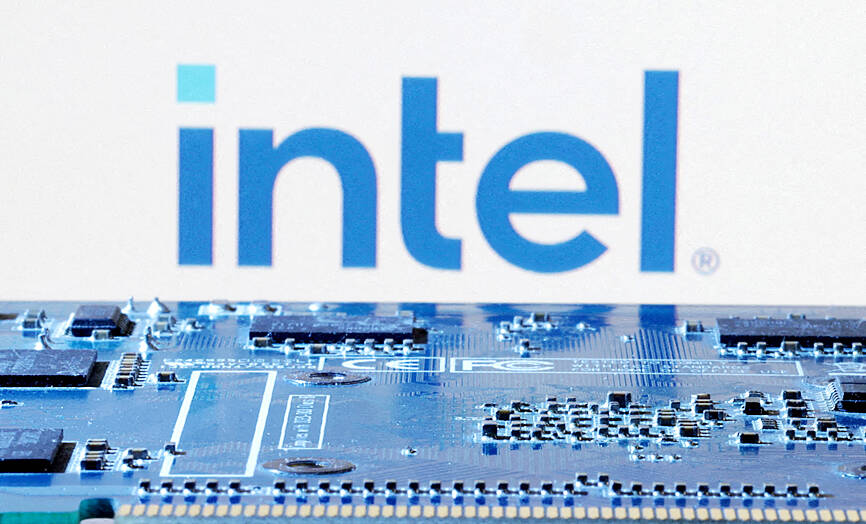Intel Corp is poised to announce plans this week to cut more than 20 percent of its staff, aiming to eliminate bureaucracy at the struggling chipmaker, according to a person with knowledge of the matter.
The move is part of a bid to streamline management and rebuild an engineering-driven culture, according to the source, who asked not to be identified because the plans are private. It would be the first major restructuring under new chief executive officer Lip-Bu Tan (陳立武), who took the helm last month.
The cutbacks follow an effort last year to slash about 15,000 jobs — a round of layoffs announced in August. Intel had 108,900 employees at the end of last year, down from 124,800 the previous year.

Photo: Reuters
A representative for Intel declined to comment.
Tan is aiming to turn around the iconic chipmaker after years of Intel ceding ground to rivals. The Santa Clara, California-based company lost its technological edge and has struggled to catch up with Nvidia Corp in artificial intelligence computing. That contributed to three straight years of sales declines and mounting red ink.
Tan has vowed to spin off Intel assets that are not central to its mission and create more compelling products. Last week, the company agreed to sell a 51 percent stake in its programmable chips unit Altera Corp to Silver Lake Management LLC, a step toward that goal.
Intel needs to replace the engineering talent it has lost, improve its balance sheet and better attune manufacturing processes to the needs of potential customers, Tan said last month at the Intel Vision conference.
The company is scheduled to report first-quarter results today, giving Tan an opportunity to lay out more of his strategy.
Although the worst of Intel’s revenue declines are now behind it, according to Wall Street estimates, analysts are not projecting a return to its previous sales levels for years, if ever.

Shares in Taiwan closed at a new high yesterday, the first trading day of the new year, as contract chipmaker Taiwan Semiconductor Manufacturing Co (TSMC, 台積電) continued to break records amid an artificial intelligence (AI) boom, dealers said. The TAIEX closed up 386.21 points, or 1.33 percent, at 29,349.81, with turnover totaling NT$648.844 billion (US$20.65 billion). “Judging from a stronger Taiwan dollar against the US dollar, I think foreign institutional investors returned from the holidays and brought funds into the local market,” Concord Securities Co (康和證券) analyst Kerry Huang (黃志祺) said. “Foreign investors just rebuilt their positions with TSMC as their top target,

REVENUE PERFORMANCE: Cloud and network products, and electronic components saw strong increases, while smart consumer electronics and computing products fell Hon Hai Precision Industry Co (鴻海精密) yesterday posted 26.51 percent quarterly growth in revenue for last quarter to NT$2.6 trillion (US$82.44 billion), the strongest on record for the period and above expectations, but the company forecast a slight revenue dip this quarter due to seasonal factors. On an annual basis, revenue last quarter grew 22.07 percent, the company said. Analysts on average estimated about NT$2.4 trillion increase. Hon Hai, which assembles servers for Nvidia Corp and iPhones for Apple Inc, is expanding its capacity in the US, adding artificial intelligence (AI) server production in Wisconsin and Texas, where it operates established campuses. This

Nvidia Corp chief executive officer Jensen Huang (黃仁勳) on Monday introduced the company’s latest supercomputer platform, featuring six new chips made by Taiwan Semiconductor Manufacturing Co (TSMC, 台積電), saying that it is now “in full production.” “If Vera Rubin is going to be in time for this year, it must be in production by now, and so, today I can tell you that Vera Rubin is in full production,” Huang said during his keynote speech at CES in Las Vegas. The rollout of six concurrent chips for Vera Rubin — the company’s next-generation artificial intelligence (AI) computing platform — marks a strategic

US President Donald Trump on Friday blocked US photonics firm HieFo Corp’s US$3 million acquisition of assets in New Jersey-based aerospace and defense specialist Emcore Corp, citing national security and China-related concerns. In an order released by the White House, Trump said HieFo was “controlled by a citizen of the People’s Republic of China” and that its 2024 acquisition of Emcore’s businesses led the US president to believe that it might “take action that threatens to impair the national security of the United States.” The order did not name the person or detail Trump’s concerns. “The Transaction is hereby prohibited,”